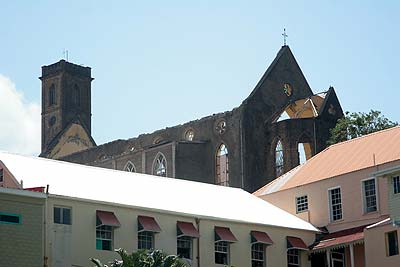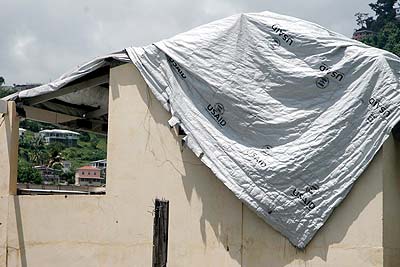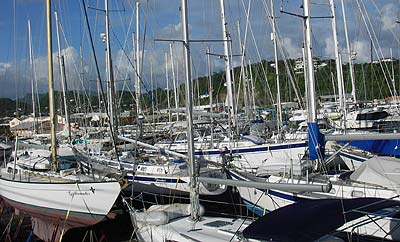We’ve made up our mind for Hurricane season

07/24/2006, St. George, Grenada
Friendly, helpful, resilient people. That’s how I would describe Grenadians after being here only a couple of weeks. People greet you warmly on the street, some may offer a service, like a taxi or selling goods and if declined, simply reply, “Enjoy your day”. The open air markets are abuzz with activity as rows of stall ladies sit under umbrellas wearing their hats or scarves selling what they’ve grown on their land – fruits, vegetables, spices. It is simply delightful. And if you’re not sure how to cook the vegetables you see, you’ll hear the ladies say… “you can cook it like this or I do it like that. Don’t forget to add a little heat to it or you can spice it up, too.” And Grenadians are resilient. They are rebuilding their country after the devastation of Hurricane Ivan in 2004 and Hurricane Emily last year.
Hurricane devastation
In 2004 and 2005, Hurricanes Ivan and Emily swept through this tiny island and almost completely wiped it off the map with its 210 km/ hour (165 mile/hour) winds. Imagine that wind speed – two hundred and ten kilometres an hour! For more than 12 hours Ivan pounded this little Caribbean island. The eye of Ivan slammed straight into Grenada and the next year, Emily came down with a vengeance. As you can imagine, there was wide-spread devastation from one end of the island to the other. More than 90% of all the buildings in the country were damaged or destroyed. Talking with a local Grenadian woman who lived about an hour up in the country, she described the eye of Ivan like a twister. It was a wall of white, with lightning all around. She watched as Ivan sheared off the tops of all the trees on the mountainsides near her home. The trees were snapped off like match sticks. In St. George, we met Dorothy, who told us that when she looked out of her apartment, hours after Ivan, all the buildings had no roofs, the roads were covered with trees, and debris was everywhere in her neighbourhood. Last year, as they waited for Hurricane Emily, Dorothy and her 9-year old daughter, Kim, set up a tarp like a tent, in the little room they called home. They pulled their beds together and huddled under the tent with nothing but a few clothes and a flashlight. As Hurricane Emily blew over their heads, in less than 3 hours, the worst of it was all over but the winds still howled for days after. They’d lost part of their roof, but because of the tarp they had set up inside, they were dry and safe. They’ll be doing the same thing this year, if it’s necessary, she said.
The country’s number one export crop – the Nutmeg – was almost completely destroyed by both hurricanes. Ivan, in 2004, did the most damage. Up until 2004, Grenada supplied 40% of the world’s supply of Nutmeg. But that’s not the case anymore. Although nutmeg is still available locally, the export industry is making a very slow recovery. The main problem has been that there are few nutmeg trees standing. And for the trees that do remain, farmers struggle to get to those trees on their farms, because there is so much tree debris on the ground. The nutmeg is easy to harvest because the fruit simply falls to the ground, you open it up and there’s the nutmeg. But if you can’t get close to the trees, then you can’t harvest the nuts. This year, the Government is distributing more than 8,000 nutmeg tree saplings they’ve been growing in nurseries to farmers and it is hoped that more than 20,000 trees will be handed out by the end of 2006. As for accessing trees that are already producing nuts, it will just take time to clear those areas. So it will be a while before Grenada is back to the production it used to have – likely 15 – 20 years – but there is determination and hope.
Rebuilding

The bleachers might be damaged but that won’t stop a game of cricket being played at the local cricket pitch
In many parts of the island, the recovery efforts are taking place. Although you can see a great deal of damage around – buildings with no roofs, twisted metal structures that are remnants of community halls or stadiums, hillsides strewn with dead trees – there’s also a sense of optimism and determination. Businesses and Government together are finding the money so re-construction efforts can take place in some areas, especially in St. George, the capital. And thanks to the generous support of US and Canadian Aid, many of the schools have been repaired. Now the task of helping rebuild their libraries and resources is taking place. A brand new sports stadium is being rebuilt thanks to the generous support of the country of China. This will be finished just in time for Grenada to take part in hosting the World Cup Cricket event in April 2007. The building skeletons that do remain are reminders to us all of the power and devastation of hurricanes and that some things never recover because there simply isn’t enough money.
For boaters like us, Grenada has long been considered a safe place to go during hurricane season. Up until 2004, Grenada hadn’t had a direct hit from a hurricane in more than 50 years. So it seemed like a safe place. During hurricane season alot of people take their boats out of the water, secure them in a structure called a cradle, and leave them for 3 or 4 months in boatyards. In some boatyards, there can be more than 400 boats all lined up like dominoes. So, if one boat falls over, there’s a dominoes effect. And that’s exactly what happened in Grenada when Hurricane Ivan came through in 2004.
Alot of boats were damaged and many people lost everything they owned. Many people no longer think of Grenada as being that safe haven to store their boats, with hurricanes coming two consecutive years in a row. Now, alot of boaters head further south to Trinidad or Venezuela, where it’s said hurricanes are less likely to occur. But, with hurricanes, no one really knows. Grenada’s boatyards have made substantial improvements and they say they’ve learned their lessons from 2 years of hardship. Boats are being stored differently, stronger cradles are being built and boats are getting strapped down so there is little chance of toppling over. With this kind of reassurance, at least 500 boat owners are putting their trust in Grenada’s improvements.

Our friends on s.v. La Gallipot have their boat strapped down to the ground in its cradle while they’re visiting family and friends back home in Montreal
What’s the hurricane projection like for this year ? Well, for 2006, the experts from Colorado State University predict it will be “another very active Atlantic basin tropical cyclone season…with above-average major hurricane landfall risk in the Caribbean” . The prediction is that there will be 9 hurricanes with 5 hurricanes being categorized as “intense”. Now you might be wondering about us. We too feel positive about protection here in Grenada and we’ve decided to stay here for the season. We won’t be taking Amanzi out of the water. But we’ve found the local hurricane hole which is surrounded by a Mangrove swamp. There’s never any promises or guarantees but we feel well-prepared. Hopefully, this will be the year when predictions are not accurate and things change for the better here in Grenada.






